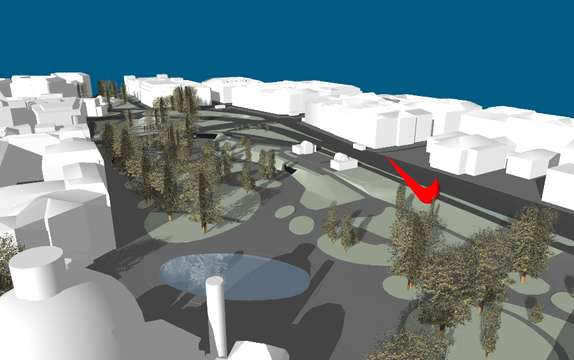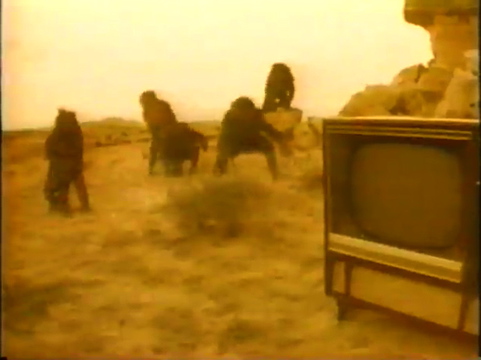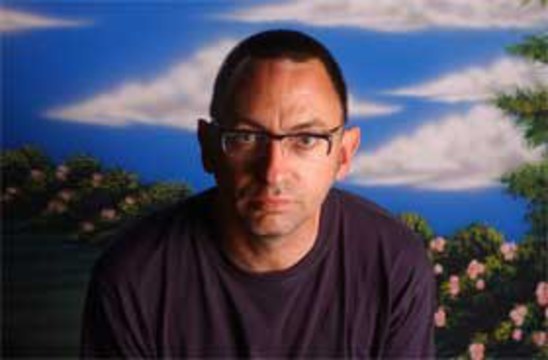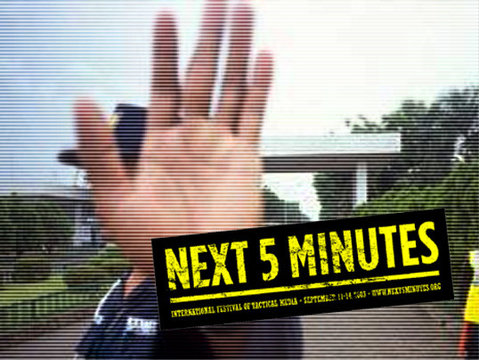Search results for 'media'
Candida TV
Andy Cameron
Next 5 Minutes 4
The Society of the Spectacle
2002 translation.
The DEF of Tactical Media
Campaigns and Movements Although a global conference, the first Next 5 Minutes, held six years ago(1993), was dominated by the first large scale encounter between two distinctive cultural communities. On the one hand, Western European and North American campaigning media artists and activists and on the other hand their equivalent from the former communist countries of Central and Eastern Europe, dissident artists and samizdat activists, still basking in the after glow of the role they played in bringing down the communist dictatorships. In the excitement of discovering each other, these two communities tended to gloss over their ideological differences,understandably emphasising only the shared practice of exploiting consumer electronics (in those days mostly the video camcorder) as a means of organisation and social mobilisation. We referred to these practices, and the distinctive aesthetic to which it gave rise, tactical media.
ReadSocial Media and the UK Riots: "Twitter Mobs", "Blackberry Mobs" and the Structural Violence of Neoliberalism
"One formula [...] can be that of the mob: gullible, fickle, herdlike, low in taste and habit. [...] If [...] our purpsoe is manipulation - the persuasion of a large number of people to act, feel, think, known in certain ways - the convenient formula will be that of the masses". - Raymond Williams
ReadThe Next 5 Minutes
tactical media event
Amsterdam & Rotterdam, The Netherlands, 12-14 March, 1999
www.n5m.org
(Source: Updated announcement Feb 11, 1999)
In memoriam: Oleg Kireev
On Friday April 3, 2009 we received the terribly sad news that our friend and ever inspiring colleague Oleg Kireev from Moscow had died, apparently as a result of suicide. We are left behind as friends and colleagues, bereaved and puzzled by this dramatic fact. Kireev was a prominent guest in some of the most important projects in the art / media / politics triangle, which we had the honour developing at De Balie. Kireev was a crucial figure in circles of free culture, media activism and the arts in Moscow, one of the most demanding environments for such activity one can think of.
ReadTactical Media After 9-11
It is tempting to portray '9-11' as a turning point. Gore Vidal warns
that, since September 11, the US is in danger of turning into a "seedy
imperial state." Make war, not politics. The new patriotism requires: "Disruption, including obstructing the view or hearing of others, will
not be tolerated." The list of measures to restrict civil liberties,
freedom of speech and privacy, or what?s left of it, doesn?t stop. A
recent conference in Perth concluded that post-September 11 reporting
adds to divisions and stereotypes. "The media's failure to provide more
perspectives to news consumers and ask critical questions is fuelling a
culture of fear and blame around the world, experts say."
The Power of Social Media - The Helplessness of Traditional Media and #direngeziparki #direnankara, #direnizmir
Residents of Istanbul started a peaceful sit-in as a reaction to the city governments plans to demolish Taksim Square's Gezi Park on the May 29th 2013. The demolition was part of the plan to replace the park and construct a shopping mall on one of the only green areas left in the central cross road of Istanbul. The reaction was sparked by a decision making process that lacked any consultation with citizens. Inhabitants of the city initiated this on-site protest to raise their voices against the demolition plans, but also to exercise their right to freedom of speech and to freedom of assembly in a democratic society.
ReadCarbon Defense League
Carbon Defense League (CDL) is a collective of media artists, technologists, activists and critical theorists working to explore the intersection between radical theory, traditional activism, and technology subversion through the creation of tactical media projects utilizing communication system technologies. The collective began in Pittsburgh, PA in 1997 and now has international membership with concentrations in areas including Michigan, New York, Philadelphia, Pittsburgh, Spain, Australia, Amsterdam, and the United Kingdom.
ReadStreaming Networks
We've had the camcorder revolution. It made making videoprograms
cheaper. Audio-equipment is affordable, so radiomaking is possible for
a large amount of people too. So for a long time already the masses are
potential mediaproducers. There were only minor successes in accessing
the broadcast channels both legally and illegally. But the efficient
one-to-many distribution system (radio and tv) are chocked, regulated,
hard to get access to. The Internet having the capacity for streaming
media seems to promise new possibilities. Boundless access, for anyone
making radio, and maybe in the near future TV. Some are pessimistic,
and see these channels soon closed and regulated as well. What will
this streaming media look like and who will be streaming?
Critical Art Ensemble
A collective of five artists dedicated to exploring the intersections
between art, technology, radical politics and critical theory.
Social media activism in the Arab World and China
One day seminar and public evening debate on social media activism in the Arab World and China, organised by the Centre for Globalisation Studies of the University of Amsterdam, Monday 21 January 2013.
Read






